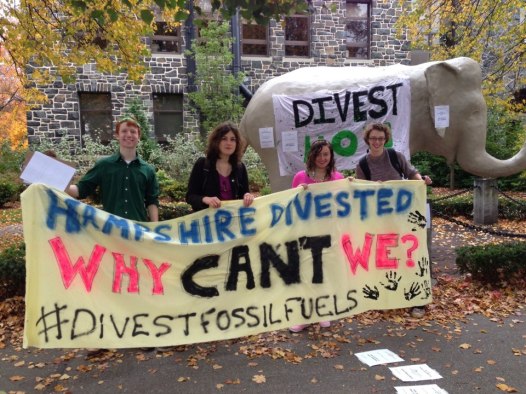Here’s a guest-post from divestment organizers at Tufts. They had a busy fall semester kicking off their Go Fossil Free divestment campaign and are gearing up for an exciting spring. Check it out.
In recent weeks, the nation has seen the fervor mounting over the proposed Keystone XL Pipeline, and the Jumbos invested – if you’ll forgive the pun – in such issues have been paying keen attention. In a way, these recent events could turn out to serve as a great crescendo, a gathering-up of momentum, to usher in the new spring semester at Tufts; and with it, a new surge of advocacy for divestment of our university’s endowment from fossil fuels corporations. But before that rapidly-approaching arrival of the future – classes resume on January 16th – let’s take a moment to review the work and journey of Tufts Divest since its inception in the Fall of 2012.

Making Divestment Banners
Most people of the environmental mindset – indeed, most Americans who haven’t been living under a rock for the past six months – remember Bill McKibben’s vigorously viral Rolling Stone article, “Climate Change’s Terrifying New Math,” published in August of last year. Readers were informed of exactly why being freaked out is, according to the arithmetic, the only rational reaction to the global warming’s trajectory. McKibben went on to suggest a specific and effective outlet for all that anxiety: divestment, a time-tested strategy in sanctioning The Powers That Be (in this case, fossil fuel corps and the investors that back them) into heeding to the concerns of the indignant observers (environmentalists and humanitarians worldwide, collegiate and otherwise).
Use of the word “terrifying” turned out to seem far from an exaggeration: to date, nearly 200 colleges and universities – and, recently, high schools and even Seattle – have formed divestment campaigns, inspiration largely thanks to McKibben-founded 350.org’s Go Fossil Free movement. Tufts’ began this past September, and one of the first actions was a mass petitioning effort. Short-term goals mounted larger and larger until we were eventually able to present to our administration, and greater student body, a list of over1,000 signatures from students, alumni, and faculty, supporting removal of investment from the institutions denoted by Carbon Tracker Initiative’s list of the top 200 publicly-owned fossil fuels companies.
Official dialogue with Tufts University administration commenced early October, with divestment representatives meeting with the University’s Vice President to discuss our campaign and the issue at hand. Just a couple short weeks later was a national Day of Action for Fossil Fuel Divestment, on October 24th. We marched through campus with pro-divestment banners, spreading the word about the campaign, culminating with a banner drop in the campus center, and also draping our cement mascot Jumbo in a “Divest Now!” toga of his own.

Fossil Fuel Day of Action – Jumbo gets a divestment toga!
Throughout the semester, we organized several “teach-in’s,” sharing information about the movement, climate change science, the economics and intentions of divestment, and other relevant topics. Along with Students for a Just and Stable Future (SJSF), Tufts Divest joined the Better Future Project for a gathering of climate activists, including McKibben himself, in early October. Members of the divestment campaign also met this author of the fossil fuels divestment movement when 350.org’s nationwide Do The Math tour made its stop in Boston in mid-November.
Collaborations with SJSF continued through the semester, including participation in theVigil to End Climate Silence, October 23rd to the 30th. This weeklong stakeout and rally at Government Center in downtown Boston featured a lineup of speakers and sought to both draw widespread attention to climate issues, as well as urge then-senatorial hopefuls Elizabeth Warren and Scott Brown to speak out on the need for governmental and policy action to deal with the climate crisis. Finally, amidst all these other projects, Tufts Divest – along with our post-grad partners of the Tufts Alumni for Fossil Fuel Divestment – was hard at work craftingan official proposal to the Tufts Board of Trustees, with demands and recommendations for divestment of the Tufts University endowment from fossil fuel corporations. The proposal advocates reinvestment into companies which exhibit social responsibility and promote societal welfare.
As we move forward into the Spring semester of 2013, Tufts Divest is looking to hit the ground running. We look forward to our Fossil Fuel Divestment Teach-In later this month; to expanding student awareness and support on campus; and to using our position of privilege, and our unique student power, to keep up the fight for climate justice.
–K.C.